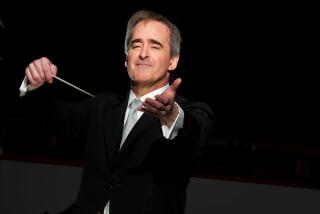Concord Brings Early Spanish Songs to Life
Much of the most interesting work in early music these days is being done by vocal ensembles, which are a major export industry in England. The Concord Ensemble, however, hails from Indiana University. This fine young American addition to the scene made its Southern California debut Sunday afternoon at Pepperdine University with a short survey of 16th century Spanish vocal music.
Formed as an informal post-graduate study group, the ensemble won the Early Music America Recording Competition in 1998, leading to a CD on Dorian and hence to a short tour featuring music from the disc. The agenda emphasizes the sacred music of the giants of the Spanish golden age, Cristobal de Morales and Tomas Luis de Victoria, but Sunday, secular part-songs by Juan Vasquez easily stole the show.
Vasquez’ villancicos were enormously popular in his time, and it is not hard to hear why in the idiosyncratic harmonies of the second of his “Lagrimas de mi consuelo” settings, with its wonderfully flip send-off, or the fresh cadential formula closing “El que sin ti bibir ya no querria.”
The Concord Ensemble sang with maximum clarity, keen rhythmic and textual point, and a carefully balanced blend preserving individual character and ensemble integrity. At this point, countertenor Paul Flight, tenors Daniel Carberg, Pablo Cora and N. Lincoln Hanks, baritone Sumner Thompson and bass Daniel Cole must be well practiced in this program, but they still perform it with relish and nuance, including an attention to dynamic effects rare in early music.
From the liturgical side of the era, Concord offered Victoria’s Mass “Dum complerentur” and a pair of motets each by Victoria and Morales. From the virtually unclassifiable side came Mateo Flecha’s ensalada “La Guerra,” a madrigal-like allegory in song, full of vocal fanfares and dances, with a polyphonically pious Latin moral to close.
The ensemble revealed something of its versatility in encore, singing a new setting of Wendell Berry’s “The Summer Ends” by member Hanks, who also is a recent addition to the Pepperdine faculty. This substantial part-song capitalizes on sophisticated, contemporary close harmony and a real flair for vocal sonority.
More to Read
The biggest entertainment stories
Get our big stories about Hollywood, film, television, music, arts, culture and more right in your inbox as soon as they publish.
You may occasionally receive promotional content from the Los Angeles Times.










